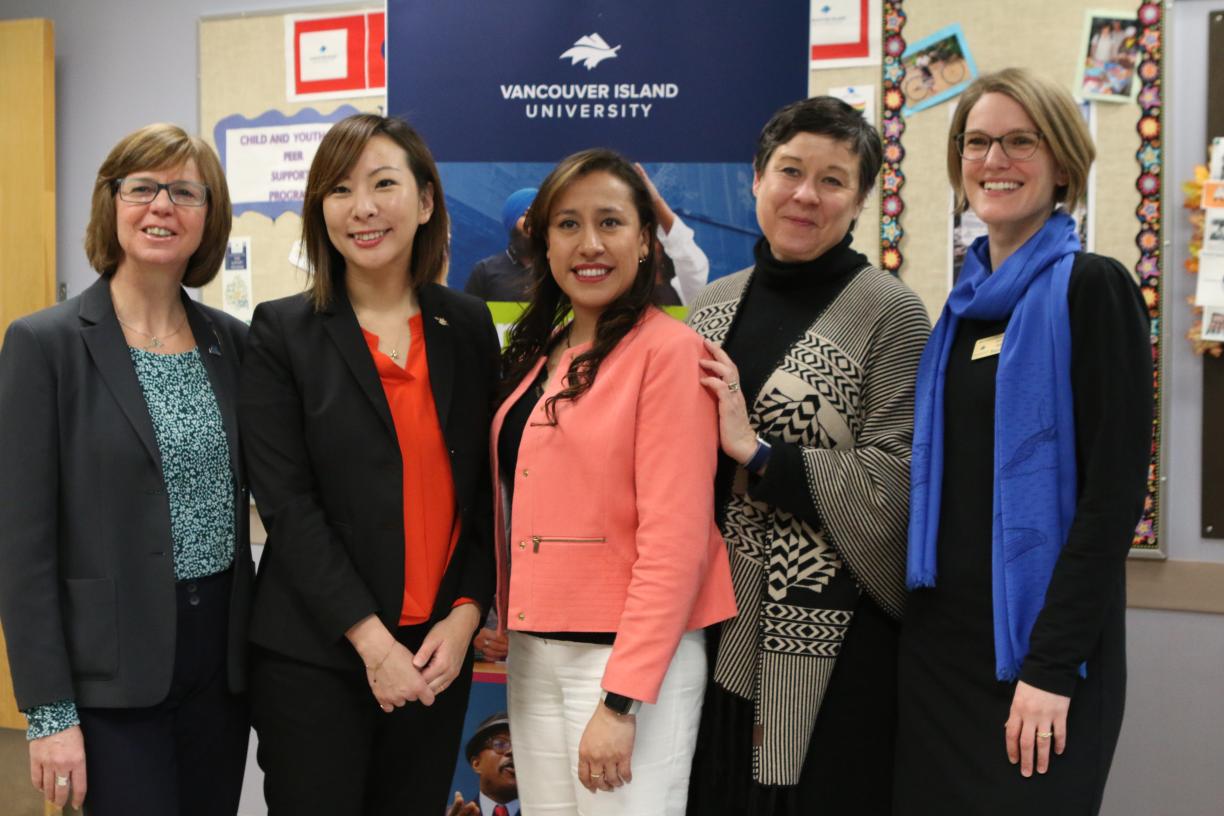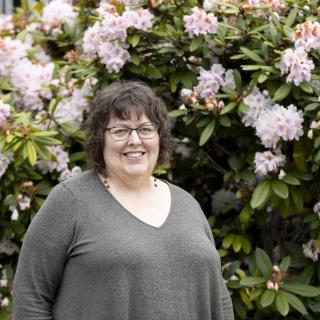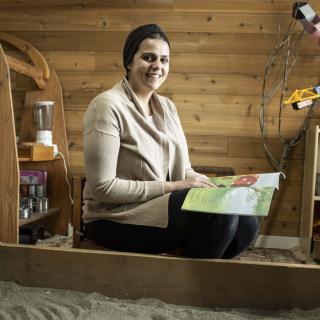Vancouver Island University (VIU) has received funding for two pedagogist positions to work with early childhood educators at select child care centres in Nanaimo and Cowichan, as well as students in the University's Early Childhood Education and Care (ECEC) program.
"Thank you to the Ministry of Children and Family Development for funding this important initiative to introduce the new role of pedagogist across British Columbia," said Antje Bitterberg, an Instructor with VIU's ECEC program and now a pedagogist through the province's Early Childhood Pedagogy Network. "As a pedagogist, I will work alongside children, educators, practicum students and families. I will support educators to explore the BC Early Learning Framework. This ongoing access to rich professional development will, I hope, lead to increased retention of educators in this field. Working collaboratively, we will be able to question conventional structures in education and wonder together how we might see things anew."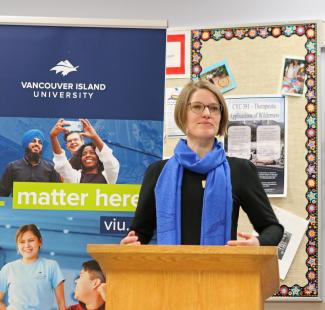
Please see this Ministry of Children and Family Development press release below for more details:
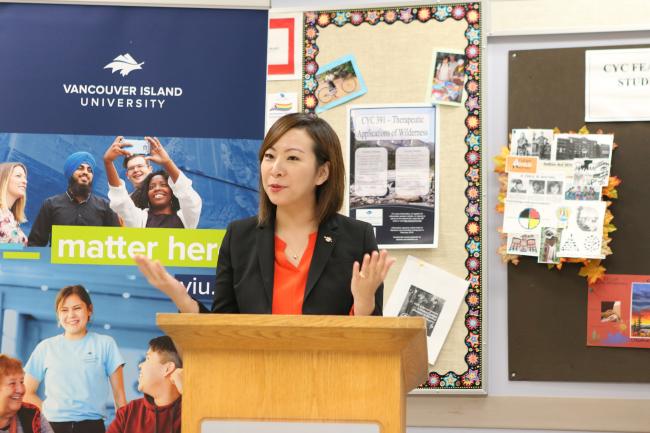
New teaching network a win for ECEs, quality child care
British Columbia’s early childhood educators will now benefit from an expanded professional development program geared to exploring the latest child care teaching philosophies, curriculums and techniques.
Run by the Early Childhood Pedagogy Network (ECPN), a $2-million investment allows 32 teaching specialists, known as pedagogists, to be hired around the province. This improves access to professional development for ECEs and boosts the quality of child care for children and families.
Each pedagogist will work with up to 45 ECEs in their area through community hubs at eight post-secondary institutions, 10 child care referral centres and seven Indigenous communities, in partnership with the BC Aboriginal Child Care Society.
The program is a partnership between the Province and researchers at Capilano University and
Western University in Ontario. It puts B.C. on the map as one of only two provinces in Canada offering this kind of support to ECEs.
“A commitment to quality care is at the heart of our Childcare BC plan. By bringing together ECEs to share their experiences and learn from others, we can boost the quality of child care for families throughout B.C.,” said Katrina Chen, Minister of State for Child Care. “Our government is committed to helping our early care and learning professionals succeed. Programs such as this one are making a career as an ECE more desirable and sustainable, and brings change to a sector that has for too long been ignored.”
The program expands professional learning opportunities from one-time training opportunities, such as workshops, to continuous learning, where professional development is done daily and in the context of individual child care programs.
“As a former ECE, I know that my learning didn’t stop when I graduated. Every day, I was adapting and refining my techniques to provide better care for the families I served,” said
Katrine Conroy, Minister of Children and Family Development. “This network will help ECEs to collaborate, learn from each other and bring new early learning theories to their practice, making it easier for families to pursue their own education and careers, knowing that their kids are being nurtured and inspired during their time in child care.”
Investing in child care and early childhood education is a shared priority between government and the BC Green Party caucus, and is part of the Confidence and Supply Agreement.
Quotes:
Sheila Malcolmson, MLA for Nanaimo
“More ECEs in Nanaimo mean increased support for our children to grow and thrive. ECEs create programs that inspire kids and nurture a love of learning.”
Sonia Furstenau, MLA for Cowichan Valley
“It has been a pleasure to work with and learn from Dr. Pacini-Ketchabaw and her colleagues and I am delighted this program is moving forward. The early learning years are vitally important, as are the educators who teach and nurture B.C.’s youngest. We cannot just focus on the number of child care spaces we create. Though that is important ̶ we must always be mindful of fostering and improving quality. I’m confident this program will do just that.”
Veronica Pacini-Ketchabaw, co-director, B.C. ECPN
“We want to create a system where ECE programs are developed within local communities to respond to the specific needs of that area. This network will provide professional learning that’s practical and grounded in the challenges and opportunities ECEs face. By providing this funding, the government is helping create a unified early learning and child care system where all B.C. children can flourish.”
Sabrina Limas, first-year student, early childhood education and care
“Working with the pedagogist is inspiring me to think about more experiences I can offer the children within the context of my practicum placement. We are exploring new learning methods and ways to use technology. Having this support means enhanced learning for the children in my care, allowing us to do what is most important ̶ help create better human beings.”
Learn More:
To learn more about the Early Care and Learning Recruitment and Retention Strategy, visit:
www.gov.bc.ca/childcare/ecestrategy
For more about Childcare BC, visit: www.gov.bc.ca/childcare
Child care factsheet: https://news.gov.bc.ca/18430
For a backgrounder on where the pedagogists will be based, visit:
https://news.gov.bc.ca/files/Backgrounder_Early_Childhood_Pedagogy_Netw…
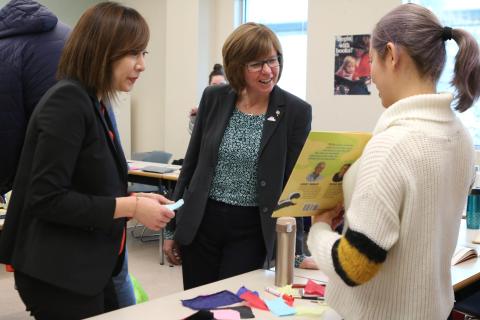
Facts about early childhood education in B.C.
- The network is part of a $136-million commitment to improve supports for B.C.’s early care and learning professionals. To date, more than 10,000 ECEs have received a $1-per hour wage enhancement, with another $1-per-hour lift to come in April 2020.
- In addition, more than 600 new early childhood education seats are helping more people pursue a career in child care. Funding for professional development supports existing educators in maintaining and upgrading their skills. More than 5,400 bursaries will help students pursue their ECE education goals.
- Pedagogies are teaching methods and practices that allow educators and learners to explore new ideas and environments for learning.
- The ECPN was created out of the former Community Early Learning and Child Care Facilitators Pilot Project, hosted by the University of Victoria.
- There are more than 20,000 certified ECEs in B.C.
- In the summer of 2019, the ECPN put out calls for expressions of interest for public post-secondary ECE programs to host a pedagogist. Applicants were asked to demonstrate how the project aligns with their teaching and curriculum philosophy, how it aligns with the BC Early Learning Framework, the ways they support professional learning in the community and why they were interested in the project.
Contacts:
Ministry of Children and Family Development
Government Communications and Public
Engagement
250 356-2028
Jenn McGarrigle, External Communications Advisor, Vancouver Island University
P: 250.740.6559 | C: 250.619.6860 | E: Jenn.McGarrigle@viu.ca | T: @VIUNews

